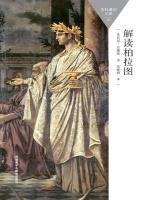2
In the ancient biographical tradition some think Plato is a nickname while his real name is Aristocles. But we don’t know if it is true because we can’t confirm the authenticity of our ancient resources. Information about Plato’s family is fairly well confirmed. Plato came from an old Athenian family, which is divided by a civil war. He is probably hostile to the resorted democracy because Socrates was executed by it.
Plato has been regarded as an outstanding philosophical and literary figure from early on. Stories gathered around him but very few facts about him is accurately recoverable, so our views of his life are inevitably restricted by his dialogues. The Laws reflects his point that fixed stylization in art is better than originality.
There are two differing interpretations contemporary with Plato. One regarded him as the son of Apollo. The other one, which was found in Seventh Letter, seeing Plato’s philosophy as politically motivated, was more widespread. But we shouldn’t claim that gives us the real Plato.
We have two firm points in approaching Plato: one is the great influence on him of Socrates, and the other is his founding of the Academy, the first philosophy school. Socrates’ opinions such as understanding what we take for granted and identifying the philosophical life as continuing enquiry had profound impress on Plato. In Plato’s dialogues Socrates is usually the chief figure. The varying roles of Socrates show different aspects of Plato‘s understanding of him. The Academy can be seen as a school for learning to think philosophically, and so to continue in the tradition of Socrates.
In the ancient world Plato was seen as the first systematic philosopher. He is the inventor of philosophy as a subject, as a distinct way of thinking about a wide range of problems.



 京公网安备 11010802032529号
京公网安备 11010802032529号